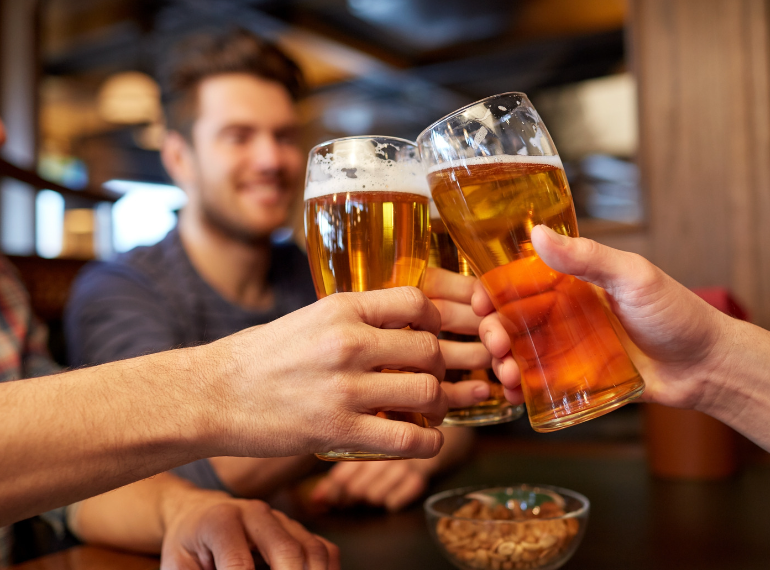Health Conditions
Say Goodbye to Post-Alcohol Chest Pain
Experiencing chest pain after a night of drinking can be incredibly concerning. Whether it’s a mild discomfort or a sharp, intense sensation, it’s important to address this issue and understand how to alleviate it.
In this article, we’ll explore effective strategies to stop chest pain after drinking alcohol, ensuring your well-being and peace of mind.
Understanding Chest Pain After Drinking Alcohol
Alcohol use might bring temporary relief, but it can also have negative consequences on the body, such as chest pain. Understanding the underlying reasons of chronic discomfort is critical in determining the appropriate treatment.
Acid reflux is a typical cause of chest pain after consuming alcohol. Alcohol can relax the lower esophageal sphincter, which prevents stomach acid from leaking back into the esophagus. When this muscle is relaxed, stomach acid can irritate the esophagus, causing chest pain.
Esophageal inflammation, or esophagitis, can also induce chest pain after consuming alcohol. It can irritate the lining of the esophagus, causing irritation and pain.
In rare circumstances, chest pain after consuming alcohol may indicate a more serious heart condition. Excessive alcohol drinking can strain the heart, causing chest pain, palpitations, and abnormal heart rhythms. It is critical to distinguish between alcohol-induced chest pain and possible heart problems.

Causes of Chest Pain After Drinking Alcohol
Understanding the reasons of chest pain after drinking alcohol will help you determine the best course of action to relieve your discomfort. As previously stated, acid reflux and esophagitis are common reasons.
Acid reflux occurs when the lower esophageal sphincter fails to seal properly, enabling stomach acid to flow back into the esophagus. Alcohol can relax this muscle, causing acid reflux and chest pain.
In contrast, esophagitis is an inflammation of the esophagus. The irritating characteristics of alcohol can promote inflammation, resulting in chest pain.
In rare circumstances, chest pain after consuming alcohol may indicate an underlying cardiac issue. Alcohol can cause an increase in heart rate and blood pressure, exerting strain on the cardiovascular system. This can cause chest pain, particularly in people with pre-existing heart issues.
Alcohol and Heart Health
Excessive alcohol use can harm heart health. While moderate drinking may offer some cardiovascular benefits, excessive drinking raises the risk of heart disease.
Alcohol can cause high blood pressure and contribute to the development of arrhythmia. It can also weaken the heart muscle, resulting in diseases like alcoholic cardiomyopathy.
Individuals with pre-existing heart issues should exercise extra caution when ingesting alcohol. To guarantee that alcohol intake is safe, you must first understand the potential risks and consult with a healthcare expert.
Tips to Prevent Chest Pain After Drinking Alcohol
When it comes to alcohol-related chest discomfort, prevention is crucial. By making a few lifestyle and nutritional modifications, you can reduce your chances of feeling discomfort.
- Limit your consumption: The most effective strategy to avoid chest pain after drinking alcohol is to minimize or eliminate it. Moderation is crucial; ladies should limit themselves to one drink per day and males to two.
- Avoid trigger foods and drinks: Avoid foods and drinks that cause acid reflux and chest pain. Spicy foods, citrus fruits, carbonated beverages, and caffeinated drinks are all known triggers. Avoiding these can assist to reduce discomfort.
- Stay hydrated: Alcohol dehydrates the body, resulting in symptoms such as dry mouth and throat. Stay hydrated by drinking plenty of water before, during, and after you consume alcohol. This can assist to lower the risk of chest pain.

Immediate Remedies for Chest Pain After Drinking Alcohol
If you experience chest pain after drinking, there are a few immediate remedies you can try to alleviate the discomfort.
- Antacids: OTC antacids can help neutralize stomach acid and relieve chest pain, especially when caused by alcohol consumption. These drugs are easily available and can be taken as prescribed.
- Ginger: Ginger contains natural anti-inflammatory qualities that can help soothe the digestive tract. Drinking ginger tea or taking ginger pills may help relieve chest pain.
- Elevate the upper body: If your chest pain is caused by acid reflux, lifting your upper body can assist keep stomach acid from running back into your esophagus. Extra pillows or a wedge cushion can be used to elevate the head and upper body when sleeping.
When to Seek Medical Help for Chest Pain After Drinking Alcohol
While most occurrences of chest pain after drinking alcohol can be handled with lifestyle changes and therapies, there are times when medical attention is required.
If your chest discomfort is severe, chronic, or accompanied by other symptoms like shortness of breath, dizziness, or radiating pain, you should seek medical assistance immediately. These could be symptoms of a heart condition that requires immediate medical attention.
Furthermore, if chest pain after consuming alcohol becomes a frequent problem or seriously disrupts your everyday life, you should check with a healthcare practitioner. They can assist in determining the underlying problems and developing a specific treatment approach.
Lifestyle Changes to Avoid Chest Pain After Drinking Alcohol
In addition to urgent treatment, lifestyle adjustments can help avoid long-term chest pain following alcohol consumption.
- Quit smoking: Smoking can worsen acid reflux and contribute to chest pain. Quitting smoking can improve overall heart and lung health, reducing the risk of chest pain after drinking alcohol.
- Maintain a healthy weight: Excess weight can put pressure on the stomach, leading to acid reflux and chest pain. Maintaining a healthy weight through a balanced diet and regular exercise can help reduce the risk of discomfort.
- Eat smaller, more frequent meals: Large meals can increase the likelihood of acid reflux. Opt for smaller, more frequent meals to avoid putting excessive pressure on the stomach.

Alternatives to Drinking Alcohol
For individuals who experience chest pain after drinking, exploring alternatives to alcoholic beverages can be a viable solution.
- Non-alcoholic mocktails: Non-alcoholic mocktails provide an enjoyable experience without the alcohol. There are numerous recipes that replicate the flavors and presentation of popular cocktails.
- Alcohol-free social activities: Instead of meeting friends at a pub, try participating in alcohol-free social activities. This may involve going on a hike, taking a fitness class, or planning a game night.
- Seek help: If drinking has become an issue and is causing recurring chest pain, it may be time to seek professional assistance. Support groups and addiction counselors can offer advice and assistance on the path to sobriety.
Seeking Professional Help for Alcohol-Related Chest Pain
If chest pain after drinking alcohol persists or worsens despite lifestyle modifications and treatments, it is critical to seek medical attention. A healthcare expert can conduct a complete evaluation, do diagnostic tests, and recommend relevant treatments.
Furthermore, if you or someone you love is battling with alcoholism, speaking with a healthcare expert, counselor, or support group can have a life-changing impact. They can offer the essential help and tools to overcome addiction and improve general well-being.
Conclusion
Chest pain after drinking alcohol can be worrisome, but there are effective ways to ease the discomfort. Understanding the causes and following lifestyle adjustments, dietary changes, and therapies can help you reduce your risk of chest discomfort and live a better, more pleasant life.
It’s crucial to note that chest pain after consuming alcohol might occasionally indicate a more serious underlying issue. If your chest pain is severe, chronic, or accompanied by other troubling symptoms, seek medical assistance right once.
Don’t let chest pain ruin your fun. Investigate the practical options presented in this article and take charge of your health. With the appropriate knowledge and activities, you can find comfort and continue to enjoy socializing without worrying about chest pain.
Trusted Health, Wellness, and Medical advice for your well-being



